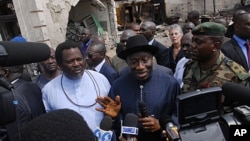The spokesman for Nigeria’s Defense Headquarters has called on citizens to provide actionable intelligence to help combat the country’s security challenges.
Colonel Mohammed Yarima said a joint task force is implementing measures that will bolster security across susceptible areas.
“What we are doing is that we have got all the vulnerable points, all the infrastructural facility… and we provide patrols all over the towns. We’ve also established check points at the entrance of the towns and the flash areas,” said Yarima.
“We are also seeking the collaboration of people to make us perform our duties effectively and to make them sleep with their two eyes closed [feel protected].”
Yarima said credible intelligence from citizens will help the security agencies efficiently resolve the country’s security problems.
His comments came after authorities in eastern Nigeria said a suicide bomb targeting a police official has killed 11 people. Officials say a bomber on a motorbike rammed into a police convoy in Jalingo, the capital of Taraba state. About 20 other people were injured in the blast, but the police official was not harmed.
President Goodluck Jonathan has come under increasing international pressure to end the country’s security crisis, which is often blamed on the violent activities of Islamic sect Boko Haram. The sect is believed to be responsible for more than 1,000 deaths since 2009.
Boko Haram, which translates in the local Hausa language as Western education is sacrilegious, claims it is fighting to impose strict Islamic Sharia law and does not recognize Nigeria’s constitution.
Some analysts have accused the security agencies of failing to effectively deal with the threats posed by violent Islamic sect. But Colonel Yarima disagrees.
“Whoever is saying that we are not doing enough to provide security and protect the lives and properties of people are not fair to us,” said Yarima.
“Rather, we will say people are not doing enough to give us more intelligence information. It is not the issue of carrying gun, carrying a whole battalion into town… The most important thing is to gather intelligent information on where those people are, where their factories are, where they keep their weapons and so on and so forth.”
Colonel Yarima also said a Joint Security Task Force, which comprises all security forces in the country, seeks collaboration from all Nigerians to help the group decisively resolve the security threat posed by armed groups including Islamic sect, Boko Haram.
“It is also the responsibility of the civilian populace to provide information to the security agencies,” said Yarima. “There is nowhere without the cooperation of people for any security agency to excel, anywhere in the world… We are not saying they should do our work. But they should give us the basic information about the people dealing with them that have questionable character.”





